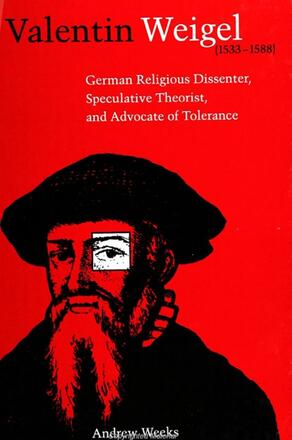
Valentin Weigel (1533-1588)
German Religious Dissenter, Speculative Theorist, and Advocate of Tolerance
Alternative formats available from:
This first English-language consideration of Valentin Weigel, an important but neglected figure in German intellectual history, examines his life and his writings on tolerance.
Description
This is the first book-length treatment in English of a central but neglected figure in German intellectual history, Valentin Weigel (1533–1588). Like his great contemporary Michel de Montaigne, Weigel anticipated the advent of a tolerant culture of individual knowledge and conscience. In the wake of the German Reformation, the dissenting Lutheran pastor Weigel argued for the inner autonomy of the lay individual in search of knowledge and salvation. His writing recapitulates the traditions of medieval mysticism (Meister Eckhart, Tauler, the Theologia Germanica), Renaissance philosophy (Cusanus, Paracelsus), and Reformation-era dissent (Sebastian Franck). In Weigel's work, these disparate sources come together in a lucid synthesis that stimulated protest and opposition against intolerance and oppression.
Taking into account the latest research and editorial achievements of scholars in Germany, this book summarizes what is known of Weigel's life, characterizes the conflicts of his times, discusses his sources, analyzes his writing work by work, and considers his impact on the emergence of tolerance in Germany.
Andrew Weeks is Associate Professor of German, Illinois State University. He is the author of Boehme: An Intellectual Biography of the Seventeenth-Century Philosopher and Mystic; German Mysticism from Hildegard of Bingen to Ludwig Wittgenstein: A Literary and Intellectual History; and Paracelsus: Speculative Theory and The Crisis of the Early Reformation, all published by SUNY Press.
Reviews
"This is an excellent study of Valentin Weigel, a significant figure who has been unjustly overlooked. In his own day Weigel might not have had much influence or stature, but given that many of his ideas were far ahead of his time, and that much of the historical writing on the Reformation has been confessionally-generated, this is not surprising. But due to the very fact that Weigel was so much more in line with the eighteenth and nineteenth centuries than the sixteenth, he presents us with an extremely interesting case study of a man out of joint with his own time. Weeks does a wonderful job of outlining and analyzing Weigel's life and thought, and of placing Weigel in the proper context of late medieval mystical traditions and the doctrinal disputes of the sixteenth century. " — Carlos M. N. Eire, Yale University